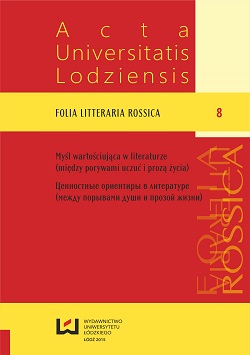Positivism in the context of the 1850–1880s (on the example of Aleksandr Yakhontov’s literary and social activities)
DOI:
https://doi.org/10.18778/1427-9681.08.06Keywords:
Aleksandr Yakhontov, positivism, nature, science, progress, ‘useful work’, ‘generation of the forties’Abstract
The paper, drawing on the fundamental research by Barbara Olaszek, for the first time examines the problem of the place and importance of positivism in the life and works of the Pskov poet of the second half of the 19th century, Aleksandr Yakhontov. It is argued that social behaviour and literary activities of Yakhontov give a reason to recognize in him the type of the ‘average man’ in its most perfect manifestation; this is also evidenced by obituaries for Yakhontov, where he was unanimously presented as a continuator of ‘the best traditions of the generation of the forties.’ Moreover, Yakhontov’s stance is largely congruent with such concept of the type which positions him as ‘not ideological and cultural, but cultural and pragmatic’ (L. N. Sinyakova, Art anthropology of Russian literature of 1840–1870-ies: the image of man in Russian literature in 1840–1870-ies., Saarbruken 2011, pp. 269–270). This brings him close to positivism, basic principles of which Yakhontov incorporated both into his literary actions and into his life. Yakhontov’s varied activities – as a liberal landlord, an official, defender of the cause of public education, local activist seeking to defend the idea of ‘social consensus in conjunction with the principles of liberal economy’ (B. Olaszek, Russian positivism: Ideas in the mirror of literature, Łódź 2005, p. 288), an innovator in various forms of manor economy management – were all centred on categories crucial for positivism: the devotion to science and progress, belief in the ‘useful work,’ conviction about the legitimacy of ‘career’ and ‘success,’ along with high ‘ideal’ values. At the same time it is asserted that positivism was one of the many trends that Yakhontov followed by synthesizing them into a dynamic unity of his philosophy of life and literary creativity. He remained consistent in his search of the ‘golden mean,’ bringing together ‘tradition’ and ‘progress,’ ‘inherited ease’ and innovative ideas and transformations leading to social prosperity.
Downloads
References
Арсеньев К. К., Новые сборники русской поэзии, «Вестник Европы» 1884, № 5.
Google Scholar
Вершинина Н. Л., «Безупречный рыцарь» нового времени Александр Николаевич Яхонтов, Псков 2011.
Google Scholar
Левин Н. Ф., «Не одной поэзией жив человек…» Служебная, земская и общественная деятельность А. Н. Яхонтова, [в:] Творчество А. Н. Яхонтова в контексте русской и зарубежной культуры. Коллективная монография, Псков 2011.
Google Scholar
Оляшек Б., Русский позитивизм: Идеи в зеркале литературы, Łódź 2005.
Google Scholar
Синякова Л. Н., Художественная антропология русской литературы 1840–1870-х годов: образ человека в русской литературе 1840–1870-х гг., Saarbrüсken 2011.
Google Scholar
Яхонтов А. Н., Стихотворения Александра Яхонтова, Санкт-Петербург 1884.
Google Scholar
Яхонтов А. Н., Горькая ошибка, подг. текста, вступ. ст. Н. Л. Вершининой, «Псков, научно-практический, историко-краеведческий журнал» 1995, № 3.
Google Scholar
Яхонтов А. Н., Светоч, Петербург 1860.
Google Scholar
Downloads
Published
How to Cite
Issue
Section
License

This work is licensed under a Creative Commons Attribution-NonCommercial-NoDerivatives 4.0 International License.












